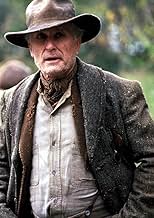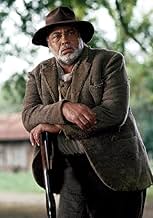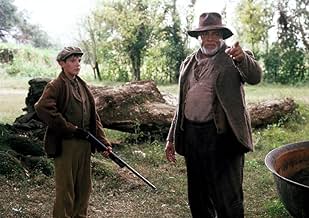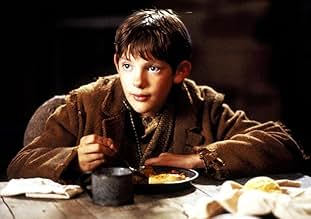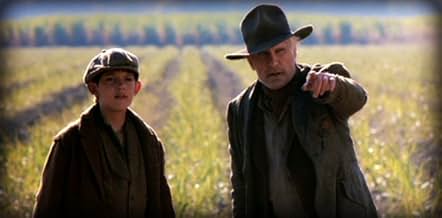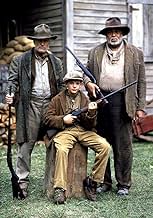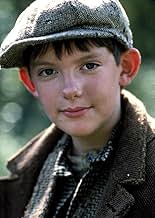अपनी भाषा में प्लॉट जोड़ेंHorton Foote's story of a teen-aged boy in the Depression who finds work on an eccentric's sugar plantation and learns life's surprising lessons from the team of convicts who also work there... सभी पढ़ेंHorton Foote's story of a teen-aged boy in the Depression who finds work on an eccentric's sugar plantation and learns life's surprising lessons from the team of convicts who also work there.Horton Foote's story of a teen-aged boy in the Depression who finds work on an eccentric's sugar plantation and learns life's surprising lessons from the team of convicts who also work there.
Bob Edmundson
- Overseer
- (as Robert Edmundson)
फ़ीचर्ड समीक्षाएं
Along with Robert DeNiro and Al Pacino, Robert Duvall brings to the screen the best film acting of our generation. Unlike the other two, he can shape a "typical" role into something original and unique. Through emotional shadings and nuance, Duvall has created a remarkable gallery of Southern characters, each individualized despite having many surface traits in common. Surely DeNiro and Pacino are highly skilled actors, but the best performances of each resemble one another to a fault. Duvall has made his share of potboilers and worse, yet his most substantial roles have generated performances of singular quality.
One of them is in "Convicts." The others? Don't miss "The Apostle," "Rambling Rose," "Tender Mercies," "Stars Fell on Henrietta," and "Tomorrow."
One of them is in "Convicts." The others? Don't miss "The Apostle," "Rambling Rose," "Tender Mercies," "Stars Fell on Henrietta," and "Tomorrow."
My review was written in November 1991 after watching the film at a Manhattan screening room.
Robert Duval adds another memorable character to his screen portfolio in Horton Foote's "Convicts", a static, uncinematic play to film adaptation. Despite good supporting turns, the feature is strictly for Foote fetishists.
Given Duvall's stature and his quality work here it makes sense that 18 months-on-the-shelf pic is getting an Oscar qualifying run. Financial problems of its distributor MCEG account for the tardy release.
Foote has provided Duvall with some of his best screen roles, including the Faulkner adaptation "Tomorrow" and "Tender Mercies". Simpatico "Convicts" team also includes director Peter Masterson, who acted in "Tomorrow" and directed Foote's "The Trip to Bountiful"; and producer Sterling Van Wagenen, who made his directorial debut several months after this picture with "Convicts" co-star Lukas Haas starring in "Alan & Naomi". And Haas re-teamed a bit larger with Duvall to great effect in "Rambling Rose".
Unfortunately "Convicts", the second play in a nine-play cycle Foote calls "The Orphan's Home", does not present the sort of material suitable for modern film audiences. It might have worked best in the special interest format of Ely Landau's "American Film Theater" adaptations of the early 1970s.
Set on Texas's Gulf Coast on Christmas Eve in 1902 (actually lensed on Louisiana locations), "Convicts" is told through the observations of 13-year-old Haas, working in a country store on Duvall's sugar cane plantation. Many year's back, the land's tenant farmers were dismissed and convicts were contracted for low-cost labor replacements -not unlike the original slavery system.
Civil War veteran Duvall runs the farm but is senile, his affliction allowing Foote to out-Pinter Harold Pinter in dialog repetition. Duvall's interpretation is dead-on, as he continually asks Haas and anyone else in earshot the same inane questions to ultimately yield comic relief.
Presented without much continuity in elliptical vignettes, the story does not have a cumulative, dramatic narrative. Instead, various forms of cryptic behaviors are observed via Haas' eyes. Haas is trying to earn enough money to buy a headstone for his late father's unmarked grave and Duvall, making accelerating promises of wealth to Haas, gradually takes the boy under his wing.
The convicts of the title die of overwork or are shot to death 'escaping' almost randomly, with director Masterson emphasizing their symbolic function in the story by not explaining why. Duvall is so absentmnded he keeps asking if a specific convict is a Negro, and hnas to be reminded that they all are.
All the adult white people in the cast are constantly drunk, including Duvall's relatives Carlin Glynn and Gary Swanson, who loll around the house aimlessly. Foote's portrait of a decadent society on its last legs will not please Southerners but is vividly realized in microcosm here.
Haas, as in "Rambling Rose", provides impressive naturalism to balance Duvall's barnstorming performance. James Earl Jones is also quite understated, and besides Mel Winkler's convincing period portrayal, there is a powerfully modern, almost militant turn by Calvin Levels as a convict in chains who tells his sad story to Haas.
Toyomichi Kurita's frequently backlit photography captures the atmosphere of the place but the location shooting fails to disguise the story's theatrical origins.
Robert Duval adds another memorable character to his screen portfolio in Horton Foote's "Convicts", a static, uncinematic play to film adaptation. Despite good supporting turns, the feature is strictly for Foote fetishists.
Given Duvall's stature and his quality work here it makes sense that 18 months-on-the-shelf pic is getting an Oscar qualifying run. Financial problems of its distributor MCEG account for the tardy release.
Foote has provided Duvall with some of his best screen roles, including the Faulkner adaptation "Tomorrow" and "Tender Mercies". Simpatico "Convicts" team also includes director Peter Masterson, who acted in "Tomorrow" and directed Foote's "The Trip to Bountiful"; and producer Sterling Van Wagenen, who made his directorial debut several months after this picture with "Convicts" co-star Lukas Haas starring in "Alan & Naomi". And Haas re-teamed a bit larger with Duvall to great effect in "Rambling Rose".
Unfortunately "Convicts", the second play in a nine-play cycle Foote calls "The Orphan's Home", does not present the sort of material suitable for modern film audiences. It might have worked best in the special interest format of Ely Landau's "American Film Theater" adaptations of the early 1970s.
Set on Texas's Gulf Coast on Christmas Eve in 1902 (actually lensed on Louisiana locations), "Convicts" is told through the observations of 13-year-old Haas, working in a country store on Duvall's sugar cane plantation. Many year's back, the land's tenant farmers were dismissed and convicts were contracted for low-cost labor replacements -not unlike the original slavery system.
Civil War veteran Duvall runs the farm but is senile, his affliction allowing Foote to out-Pinter Harold Pinter in dialog repetition. Duvall's interpretation is dead-on, as he continually asks Haas and anyone else in earshot the same inane questions to ultimately yield comic relief.
Presented without much continuity in elliptical vignettes, the story does not have a cumulative, dramatic narrative. Instead, various forms of cryptic behaviors are observed via Haas' eyes. Haas is trying to earn enough money to buy a headstone for his late father's unmarked grave and Duvall, making accelerating promises of wealth to Haas, gradually takes the boy under his wing.
The convicts of the title die of overwork or are shot to death 'escaping' almost randomly, with director Masterson emphasizing their symbolic function in the story by not explaining why. Duvall is so absentmnded he keeps asking if a specific convict is a Negro, and hnas to be reminded that they all are.
All the adult white people in the cast are constantly drunk, including Duvall's relatives Carlin Glynn and Gary Swanson, who loll around the house aimlessly. Foote's portrait of a decadent society on its last legs will not please Southerners but is vividly realized in microcosm here.
Haas, as in "Rambling Rose", provides impressive naturalism to balance Duvall's barnstorming performance. James Earl Jones is also quite understated, and besides Mel Winkler's convincing period portrayal, there is a powerfully modern, almost militant turn by Calvin Levels as a convict in chains who tells his sad story to Haas.
Toyomichi Kurita's frequently backlit photography captures the atmosphere of the place but the location shooting fails to disguise the story's theatrical origins.
Not a finely crafted film by any measure as the editing and directing were intrusive and clumsy, but Robert Duvall gives one of his totally unique and unforgettable performances as an old and very crusty Southern farmer riddled with dementia and poor health. His one day mental decline into death is one of the most fascinating performances I have ever seen in film. If you really love superior acting talent and skill don't miss it, as it is a rare master class to be sure.
Also see it for the well shown and very authentic love/hate, paternal interrelationship between Southern whites and blacks in the Jim Crow era. And, if you like Duvall in this one, see him in another nearly unknown film role just as good or better and one of my all time faves.... a retired Cuban gentilehombre in Wrestling Ernest Hemingway.
Treat yourself. Bigtime.
Also see it for the well shown and very authentic love/hate, paternal interrelationship between Southern whites and blacks in the Jim Crow era. And, if you like Duvall in this one, see him in another nearly unknown film role just as good or better and one of my all time faves.... a retired Cuban gentilehombre in Wrestling Ernest Hemingway.
Treat yourself. Bigtime.
"Convicts" is very much a third act sort of film. All the dialogue and character interaction that occurs within it comes out of the long wind-down of a late southern day. And, by extension, the life of its main character, Soll (Robert Duvall).
This is the first collaboration of director Peter Masterson and writer Horton Foote. Six years earlier, the worked together on "The Trip to Bountiful", a film that seems almost action-packed in comparison to this one. Masterson is not necessarily a good director. In fact, he's just barely this side of adequate. The slow pace leaves a lot of room for cinematographer Toyomichi Kurita, who infuses the film with just the right sense of fragile light & warmth.
Because this is essentially a filmed play, with little in the way of editing or directing prowess, it all comes to the acting. As far as I'm concerned there's no flaws here. Robert Duvall and James Earl Jones, two of the best American actors (both born in January 1931), create characters that are wholly real, uninterested in anything besides living. Lukas Haas, a young actor who I was familiar with from "Testament" and "Witness", plays a character very much like his other early roles. He is quiet, withdrawn, slightly scared and sad, somehow. These are qualities that seem natural from him.
Perhaps a title like "Convicts" is a disservice to this film. That title, along with the opening scene, seem to create an image of a far more high-strung western type picture. If slow-paced stage productions don't interest you terribly, you'll want to pass on this one as well. Otherwise, this might be exactly the film you wish they made more often.
Enjoy.
This is the first collaboration of director Peter Masterson and writer Horton Foote. Six years earlier, the worked together on "The Trip to Bountiful", a film that seems almost action-packed in comparison to this one. Masterson is not necessarily a good director. In fact, he's just barely this side of adequate. The slow pace leaves a lot of room for cinematographer Toyomichi Kurita, who infuses the film with just the right sense of fragile light & warmth.
Because this is essentially a filmed play, with little in the way of editing or directing prowess, it all comes to the acting. As far as I'm concerned there's no flaws here. Robert Duvall and James Earl Jones, two of the best American actors (both born in January 1931), create characters that are wholly real, uninterested in anything besides living. Lukas Haas, a young actor who I was familiar with from "Testament" and "Witness", plays a character very much like his other early roles. He is quiet, withdrawn, slightly scared and sad, somehow. These are qualities that seem natural from him.
Perhaps a title like "Convicts" is a disservice to this film. That title, along with the opening scene, seem to create an image of a far more high-strung western type picture. If slow-paced stage productions don't interest you terribly, you'll want to pass on this one as well. Otherwise, this might be exactly the film you wish they made more often.
Enjoy.
I don't know what to make of this film. It is certainly original and well-crafted. Duvall is outstanding as usual, as well as the supporting cast. Overall, the acting is superb, even young Horace, who is a bit stilted in his role, but that is the way the story is written. The plot never goes anywhere, and that is what is disappointing - the unidimensional nature of the story. More of a character study than a story. All in all, I may feel more strongly about the film in time, because it is the sort of cinema that stays with you, and that is the mark of a good film, anyway. Definitely unique and different and if you enjoy quirky movie, you may like this one.
क्या आपको पता है
- गूफ़When Soll thinks he hears someone in the closet he shoots three times and we see three bullet holes. But when Jackson opens the closet door to investigate, there are four holes.
- भाव
Horace Robedaux: Martha, are you afraid of dying?
Martha Johnson: No, I ain't afraid. Just not ready to go yet.
- साउंडट्रैकGolden Slippers
Sung by Jackson
टॉप पसंद
रेटिंग देने के लिए साइन-इन करें और वैयक्तिकृत सुझावों के लिए वॉचलिस्ट करें
- How long is Convicts?Alexa द्वारा संचालित
विवरण
- रिलीज़ की तारीख़
- कंट्री ऑफ़ ओरिजिन
- भाषा
- इस रूप में भी जाना जाता है
- Horton Foote's Convicts
- फ़िल्माने की जगहें
- उत्पादन कंपनी
- IMDbPro पर और कंपनी क्रेडिट देखें
बॉक्स ऑफ़िस
- US और कनाडा में सकल
- $13,623
- US और कनाडा में पहले सप्ताह में कुल कमाई
- $6,347
- 8 दिस॰ 1991
- दुनिया भर में सकल
- $13,623
इस पेज में योगदान दें
किसी बदलाव का सुझाव दें या अनुपलब्ध कॉन्टेंट जोड़ें

